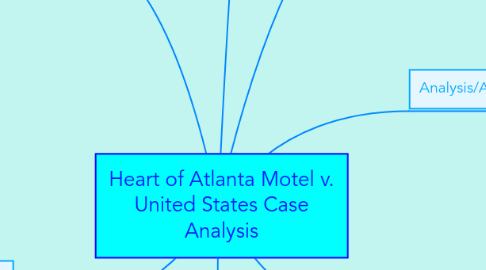
1. Subsequent Impact on Caselaw
1.1. US v. Lopez - Regulation of Gun Free Zones - Supreme Court overturned defendant's conviction for possessing gun in school zone, a violation of the Gun-Free School Zones Act. The Court held that Congress exceeded its authority (and did not meet prong one of the test under the Heart of Atlanta Motel v. US test) because the activity to be regulated did not arise out of and was not connected with a commercial transaction. United States v. Lopez, 514 U.S. 549, 115 S. Ct. 1624, 131 L. Ed. 2d 626 (1995)
1.2. US v. Morrison - Similar to US v. Lopez, Supreme Court struck down the civil remedy portion of the Violence Against Women Act (VAWA), saying that Congress exceeded its authority and "Congress therefore may not regulate noneconomic, violent criminal conduct based solely on the conduct's aggregate effect on interstate commerce." United States v. Morrison, 529 U.S. 598, 120 S. Ct. 1740, 146 L. Ed. 2d 658 (2000)
1.3. Gonzales v. Raich - Congress was within its authority to ban marijuana (even though CA permits it) because its an economic activity, and the government has a number of interests in regulating the drug trade/criminal activity. Gonzales v. Raich, 545 U.S. 1, 125 S. Ct. 2195, 162 L. Ed. 2d 1 (2005)
2. Importance for Healthcare Professionals
2.1. This Supreme Court case stripped out some of the elements of the ACA. The Court held that Congress exceeded its authority under the Commerce Clause in the "individual mandate" section of the ACA (although it was upheld under Congressional power to tax). Nat'l Fed'n of Indep. Bus. v. Sebelius, 567 U.S. 519, 132 S. Ct. 2566, 183 L. Ed. 2d 450 (2012)
3. Current Business Practice Influence By Holding of this Case
3.1. 1. The way insurance plans are structured, to adhere to the ACA.
4. Facts
4.1. Parties
4.1.1. Heart of Atlanta Motel - Original Plaintiff, Current Appellant
4.1.2. United States, Appellee
4.2. Factual Background
4.2.1. Heart of Atlanta ("HOA") is a motel in Atlanta that is centrally located and solicits interstate guests - 75% of guests are from out of state.
4.2.2. Prior to Civil Rights Act of 1964, HOA refused to rent to black individuals.
4.3. Procedural History
4.3.1. Heart of Atlanta filed suit in the US District Court for the Northern District of Georgia seeking declaratory judgment and injunctive relief from the public accommodations provisions of the Civil Rights Act. The District Court denied HOA's request for relief, and HOA appealed.
5. Conclusion/Holding
5.1. Congress appropriately passed the challenged provisions of the Civil Rights Act under its authority granted by the Commerce Clause of the Constitution.
5.1.1. Motel had to comply with Civil Rights Act and serve patrons of color
6. Rules of Law
6.1. Civil Rights Act of 1964 provisions
6.1.1. Section 201(a) 0f the Civil Rights Act states that all people are entitled to, inter alia, "accommodations of any place of public accommodation..." without discrimination as to color.
6.1.2. Section 201(b)(1) specifically defines a motel as a covered establishment, "if its operations affect commerce"
6.1.3. Section 201(c) declares that ‘any inn, hotel, motel providing lodging to transient guests affects commerce per se.
6.1.4. Section 203 prohibits withholding any privilege secured in Sections 201 or 202.
6.2. Commerce Clause
6.2.1. Commerce Clause allows Congress to regulate"commerce with foreign nations, and among the several states, and with the Indian tribes.
7. Analysis/Application
7.1. Two part test to analyze the exercise of power by Congress under the Commerce Clause:
7.1.1. 1. Whether the activity sought to be regulated is commerce which concerns more States than one.
7.1.1.1. This prong is met - interstate travel, the transportation of passengers, and the modern movement of people concerns more states than one and is not an open question.
7.1.2. 2. Whether there is a real and substantial relation to the national interest.
7.1.2.1. Congress has a national interest in legislating against the disruptive effect that racial discrimination has on commercial intercourse (even if this is a moral question).
